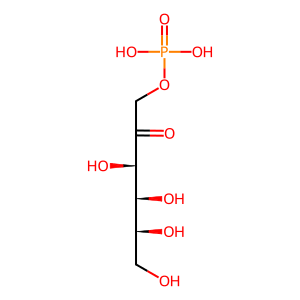Reaction: Defective ALDOB does not cleave Fru 1-P to GA and DHAP
- in pathway: Hereditary fructose intolerance
Mutations in ALDOB that cause deficiency of aldolase B block the cleavage of fructose 1-phosphate (Fru 1-P) to glyceraldehyde (GA) and dihydroxyacetone phosphate (DHAP) and cause hereditary fructose intolerance (HFI). The links between the enzyme deficiency and pathology are unclear at present, but may involve depletion of the cellular phosphate pool and increased levels of Fru 1-P (Oberhaensli et al, 1987; Bouteldja & Timson, 2010). Affected individuals can develop severe hypoglycemia, lactic acidosis, and other metabolic abnormalities when fed fructose; the disease can be effectively managed by complete exclusion of fructose from the diet. A large number of ALDOB variants have been described in affected individuals (e.g. Tolan 1995); the two missense mutant alleles annotated here are the most common (53% of those with HFI have one of these alleles) (Cross et al. 1988; Cross et al. 1990; Coffee et al. 2010), and encode full length aldolase B proteins whose catalytic activity is sharply reduced due to considerable loss of stability (Malay et al., 2002; Malay et al. 2005; Rellos et al., 2000 - see also PDB structures 1XDL and 1XDM). Other less common variants, not annotated here, retain activities and thermal stabilities similar to the wild-type (Esposito et al, 2010). The physiological role of aldolase B has been established from metabolic and DNA sequencing studies of patients with HFI (Ali et al. 1998) and in a mouse model for this disease (Oppelt et al. 2015).
Reaction - small molecule participants:
Fru 1-P [cytosol]
Reactome.org reaction link: R-HSA-5656438
======
Reaction input - small molecules:
keto-D-fructose 1-phosphate
Reaction output - small molecules:
Reactome.org link: R-HSA-5656438

